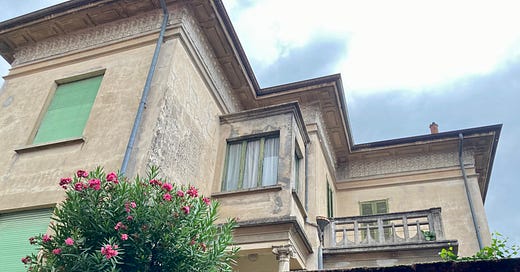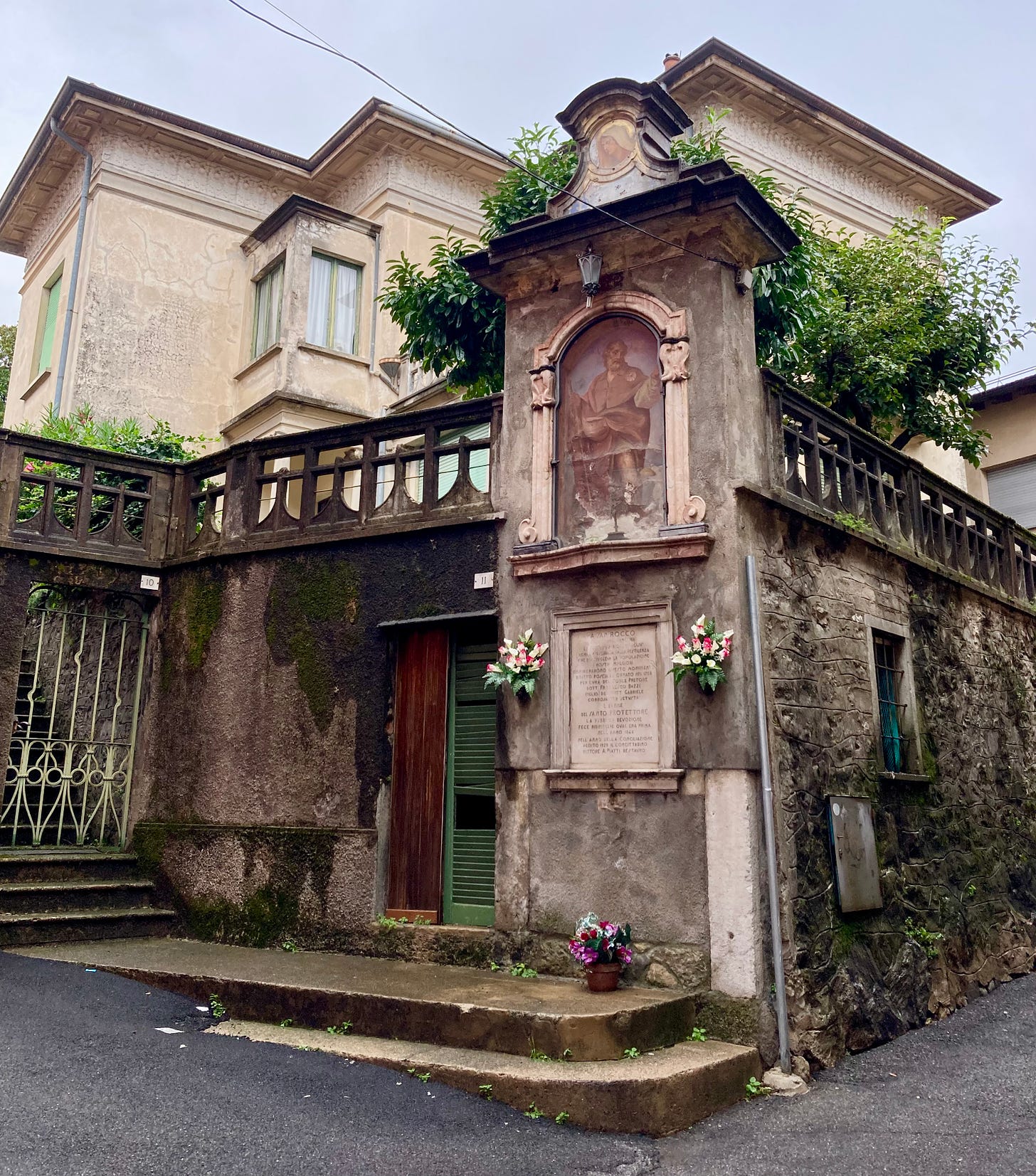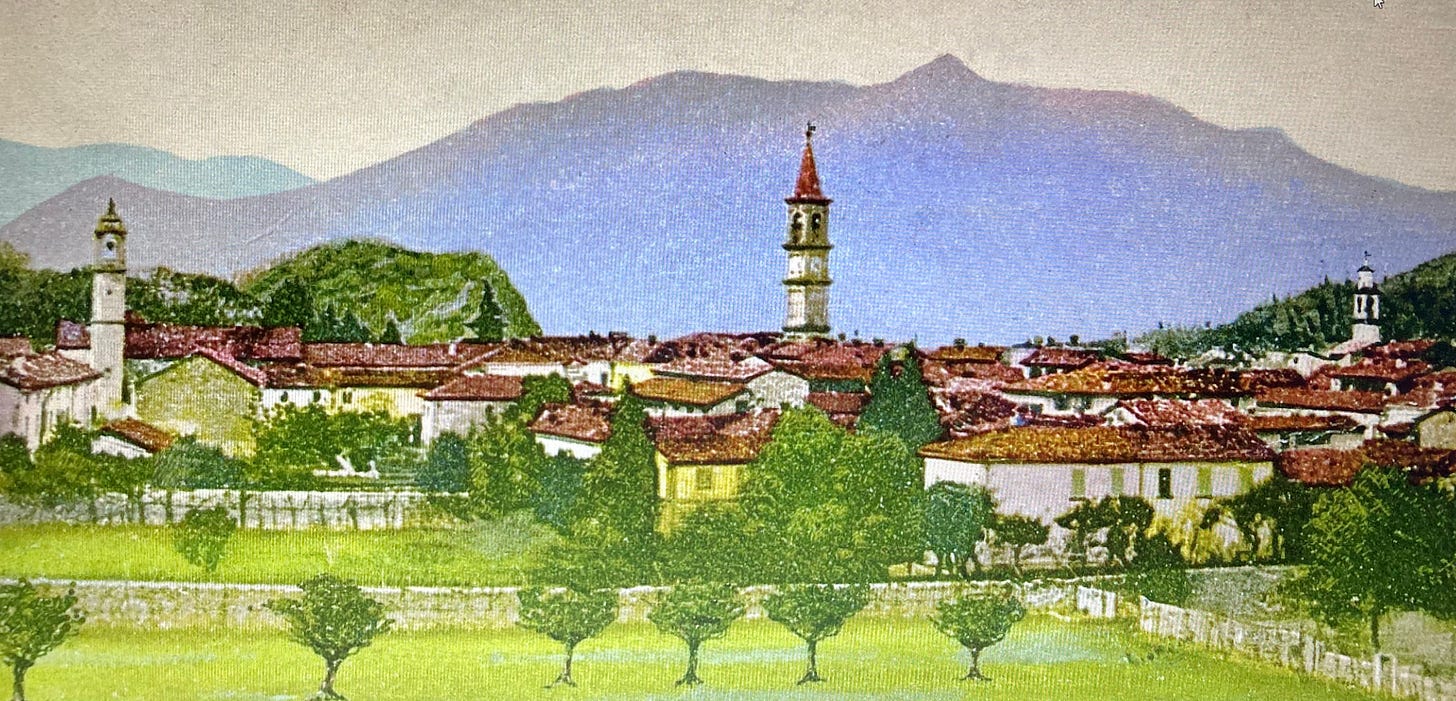A Romantic Folly
How a house in a northern Italian town stole my heart and won't give it back
If you’ve read much of “Italicus,” you know I live in Italy, and if you’ve read the post embedded below, you know I bought a house here. But there’s another house, in another region, another town, that has wrapped its metaphorical arms around me. I thought I’d escaped its clutches, but the house thinks otherwise.
I found this new (old), temptress house about a year ago when I was in Viggiù, a small town in Lombardia near the border of Switzerland where my grandfather (among other relatives) was born. I was there doing genealogy research, wandering the town, and there it was, this Liberty style villa, in disrepair and apparently empty. I fell instantly and tragically in love. I mean, come on, it even comes with its own corner edicola, or street-side mini-chapel.
Was it for sale? This being Italy, I wasn’t daunted by the lack of for-sale/rent signs; if it was empty, it would have an asking price. So I asked a friend who’s in the know about everything Viggiù—all the while telling myself this was a very bad idea indeed—and sure enough, the place was for sale. And because I’m unable to resist feeding my obsessions, even (or maybe especially) when they’re at best impractical and at worst impossible, I made an appointment to see it.
Let me reiterate: I have a house that’s very “me” in a community I love. I don’t have the money to buy another house, much less buy one that needs major renovations (which I suspected would be needed on the newly named—by me—Liberty House). But Italy has a bonus program that covers most or much of the cost of energy-saving renovations, so going to see the house didn’t seem entirely unreasonable.
I went. The house is enormous. And a total wreck. But oh, the charm, the whispering voices of the past, the terrace with fruit-laden trees! And oh, the romance of having a home not only in the town my ancestors lived in, but in the same neighborhood.
It’s a very emotional experience to walk the streets where my family, ancestors I never knew, once lived. I could imagine my grandfather playing soccer in the piazza, his mother and grandmother and aunts buying vegetables and bread where now only vestiges of shop signs remain (Alimentari, Cooperativo di Consumi), his uncles and cousins cutting stone in the courtyards that center most homes. It’s the same kind of jolt of connection and discovery that comes with digging into genealogy research. I keep asking myself why it matters if I find out who so-and-so was and where they were born and died, and the answer is always the same: I don’t know, but every new name, date, and shred of info thrills me.
And, I admit, so does the idea of living where my ancestors lived, even though I chose central Italy and not the north or the south (where my father’s and mother’s families are from, respectively) for many reasons. There’s an emotional pull to Viggiù, which is this: my dad knew little about his father’s family, not even where his father was born. (It’s a strange and sad story, with some mystery behind it, perhaps something to write about another day.) My dad died young, long before he could learn what I know about his family, long before he could fulfill his dreams for the future, and that fact pains me every day. In finding his family and seeing where they came from, I’m doing what he’d always wanted to do but never had the chance to: find his roots and understand his past.
But back to the Liberty House. What a delicious folly it would be! An elegant two-story home, it was built in the early 1900s by the town doctor. The first floor was his ambulatorio (comprising offices, an exam room, and medication room), plus a bath and kitchen; he and his family lived upstairs in four bedrooms, the light-filled spaces festooned with decorative details. There are wide hallways, high ceilings, and dozens of windows; there’s even a small upper-floor terrace—which, like the rest of the house, is crumbling. But the sense of this place, its former spirit and glory, is enough to send this former This Old House–watcher’s restoration instincts (and saliva glands) into high gear.
It was clearly too big a project for me to take on, especially from a distance—roughly six hours from Perugia by car or train. I felt simultaneously crushed and relieved when I told the owner that buying the place wasn’t possible for me. And I walked away and put it out of my mind.
Until a few days ago, when this house, this lost opportunity, this compromised dream, popped, unbidden, into my head as the centerpiece of a new novel. The story already has a title: Liberty House. And now that it’s arrived in my head, I suppose I’ll have to write it. The house will move, though—physically to the crete senesi of southern Tuscany and temporally to circa 1943. I’m already scribbling notes, asking myself questions, and please, someone, stop me now—I’m in the middle of major revisions on novel number 3 and have neither the time nor mental bandwidth for number 4 (not until 3 is closer to launching). But this is how it works—the ideas come, and, like the Liberty House and its ilk, they don’t let go.
You’re probably wondering if I’ve asked whether the house is still for sale. I haven’t, but that doesn’t mean I won’t. Because here’s the thing—sometimes it’s okay to look beyond practicality and act because our hearts tell us to. I don’t mean doing something stupid (ahem, talking about you, Liberty House!) that would bankrupt us or cause us harm. But I do think some choices, even if not financially wise or practical, can be worth the risk or tradeoffs if they’re important enough and would bring us joy. Because life is short, after all, and we can hang onto every penny we’ve got and sit at home being prudent and careful—or we can wring every fine moment out of this life we’ve got while we can.
The thing is, though I’m a homebody half the time, I’m restless too, and always tempted by the promise of change. I have a beautiful home whose history runs deeper than that of the Liberty House, and my life is rich with family and friends, books and art, the joys of travel and solitude. Why, then, this yearning for change, even disruption? The question brings to mind the post below, by Jan Peppler in “Finding Home,” in which she says, “fundamentally, it comes down to feeling the pull, the call, the sense that this is the next step, the thing I must do.”
I can relate to that, and to a quote she references, from a 1941 diary entry by Anaïs Nin: “Life shrinks or expands in proportion to one’s courage.” Amen.
I never used to think of myself as a romantic, but I’ve become one. I think of the Liberty House remaining uninhabited, crumbling more and more over time, and I feel more than sad. I feel the loss of its beauty, the ruination of what was once grand, the disappearance of someone’s dreams. Someone—I don’t remember who or where, on Twitter or Instagram, probably—posts photos of abandoned homes, and I grieve for these places, once harboring loves and lives, holding secrets in their walls and floorboards and abandoned furniture. To restore a once-spectacular house, make it into a home again, fill its hallways and rooms with friends and family, to give it new life—if that’s not romantic, what is? Now all I need is a windfall.
© 2022 Cheryl A. Ossola
Books of the week (in which a house or neighborhood is front and center):
Rebecca by Daphne du Maurier
The Dutch House by Ann Patchett
Italian Neighbors by Tim Parks
Poem of the week:
“Renovations” by W.S. Di Piero










Great post Cheryl. I feel the same way when I look at abandoned houses. I always hear the echos of the past people who lived there. It is sad. I hope you get a windfall and can buy Liberty.
Oh my goodness, this is fabulous! Well, of course the house -it looks magical - and the location and history and everything else. And even more so, it becoming the centerpiece of your next novel! And who knows, maybe from there the money will come!
Abandoned houses do indeed seem sad, waiting, either in despair or full of hope and longing. I still feel that most houses are alive. They carry an energy, much like a personality.
You are extremely kind to reference my writing. Yes, the pull, the movement forward, as if already ordained, already written in time and has just been waiting for us to catch up to it.
I'm excited to see how this story unfolds - in fiction and in life!